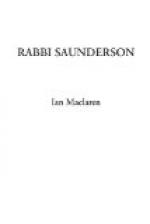through the wealth of allusion and quotation, all
in the tongues of the learned. Then he dealt
with the theology of Mr. Erskine of Linlathen, and
showed how it was undermining the very foundations
of Calvinism; yet the Rabbi spake so tenderly of our
Scottish Maurice that the Presbytery knew not whether
it ought to condemn Erskine as a heretic or love him
as a saint. Having thus brought the court face
to face with the issues involved, the Rabbi gave a
sketch of a certain sermon he had heard while assisting
“a learned and much-beloved brother at the Sacrament,”
and Carmichael was amazed at the transfiguration of
this very youthful performance, which now figured
as a profound and edifying discourse, for whose excellent
qualities the speaker had not adequate words.
This fine discourse was, however, to a certain degree
marred, the Rabbi suggested, by an unfortunate, although
no doubt temporary, leaning to the teaching of Mr.
Erskine, whose beautiful piety had exercised its just
fascination upon his spiritually-minded brother.
Finally the Rabbi left the matter in the hands of
the Presbytery, declaring that he had cleared his
conscience, and that the minister in question was
one—here he was painfully overcome—dear
to him as a son, and one to whose many labours and
singular graces he could bear full testimony, the
Rev. John Carmichael, of Drumtochty. The Presbytery
was slow and pedantic, but was not insensible to a
spiritual situation, and there was a murmur of sympathy
when the Rabbi sat down—much exhausted,
and never having allowed himself to look once at Carmichael.
Then arose a self-made man, who considered orthodoxy
and capital to be bound up together, and especially
identified any departure from sovereignty with that
pestilent form of Socialism which demanded equal chances
for every man. He was only a plain layman, he
said, and perhaps he ought not to speak in the presence
of so many reverend gentlemen, but he was very grateful
to Doctor Saunderson for his honourable and straight-forward
conduct. It would be better for the Church if
there were more like him, and he would just like to
ask Mr. Carmichael three questions. Did he sign
the Confession of Faith?—that was one;
and had he kept it?—that was two; and the
last was, When did he propose to leave the Church?
He knew something about building contracts, and he
had heard of a penalty when a contract was broken.
There was just one thing more he would like to say—if
there was less loose theology in the pulpit there
would be more money in the plate. The shame of
the Rabbi during this harangue was pitiable to behold.
[Illustration: Then arose A self-made
man]
Then a stalwart arose on the other side, and a young
gentleman who had just escaped from a college debating
society wished to know what century we were living
in, warned the last speaker that the progress of theological
science would not be hindered by mercenary threats,
advised Doctor Saunderson to read a certain German,
called Ritschl—as if he had been speaking
to a babe in arms—and was re-freshing himself
with a Latin quotation, when the Rabbi, in utter absence
of mind, corrected a false quantity aloud.




